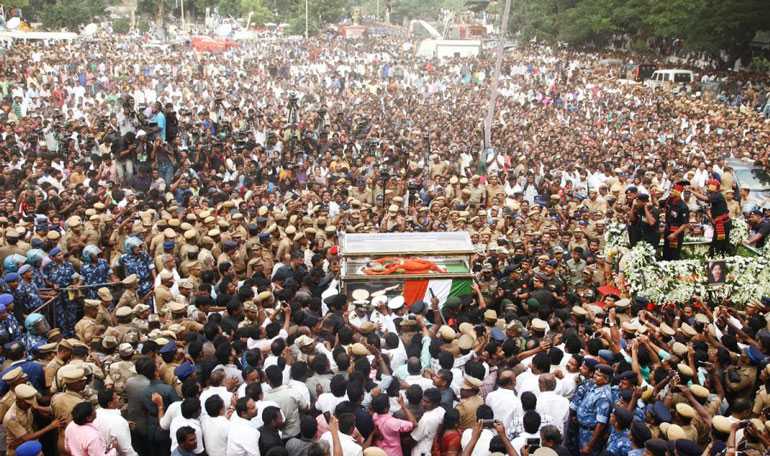Thursday Feb 19, 2026
Thursday Feb 19, 2026
Saturday, 11 August 2018 02:17 - - {{hitsCtrl.values.hits}}
The late lamented Muthuvel Karunanidhi was a phenomenal personality in more ways than one. He was five times Chief Minister of the South Indian State of Tamil Nadu, 13 times a member of the State Legislative Assembly, and had a political career which began in 1938 and ended only with is death in 2018.
He was also a key figure in all-India politics as a leader of parties opposed to the dominance of the Congress. He was indeed an icon of the Indian opposition.
|
M. Karunanidhi, a phenomenal personality |
At the state level, Karunanidhi used whatever power a state or province had under the Indian Constitution to give concrete shape to the equalitarian and rationalist ideals of the Dravidian movement. In this respect, he set an example to the other states to follow.
Under his stewardship as Chief Minister, Tamil Nadu became a progressive state founded on social justice. His polices and governmental programs released social energies long suppressed by class and caste hierarchies both in the towns and the villages of the state.
Though a Tamil “separatist” seeking a “Thani Tamil Nadu” or independent Tamil Land till 1962, Karunanidhi became a doughty defender of the rights enshrined in the Indian Constitution and fought hard for states’ rights mentioned in the Constitution.
The Central Government, ruled as it was by charismatic leaders like Jawaharlal Nehru and Indira Gandhi or by nationalists who believed in a strong Centre, tended to ignore states’ rights and gradually diluted them. At the national level, Karunanidhi was a prime mover of opposition to this tendency.
While it was the Congress leader and Indian national freedom fighter K. Kamaraj who took the first steps to liberate Tamil Nadu from the dominance of the Brahmins (who were only 2% of the population), it was Karunanidhi who took the process of de-Brahminisation forward through concrete official policies to uplift the “Backward Classes or Castes”.
He opened the doors of institutions of higher learning and the bureaucracy to the Backward Castes more widely by increasing quotas for them which went up to 50%.When he found that the existing reservation policy was not benefiting the lowest castes among the Backward Castes, he set apart a 20% quota for the Most Backward Castes (MBCs) in 1989.This put an end to a long agitation, and a very disruptive one at that, by the Vanniyar caste, which accounted for 20% of Tamil Nadu’s population.
It was in 1967, when his party, the Dravida Munnetra Kazhagam (DMK), won the State Assembly elections for the first time, that Karunanidhi became a Minister holding the important post of Minister of the Public Works (PW). As PW minister he showed administrative acumen of a high order and also an innovative mind. He built roads, bridges and other public works to increase accessibility to every part of the state.
In his first year as Chief Minister in 1969, he introduced 100% electrification of villages to narrow the urban-rural divide. “Electrification is the best indicator to understand the urban-rural divide, and as a party committed to removing inequality of all forms, this became a priority for us,” he said. Later, in 1990, he gave free power to farmers to boost agriculture production. He also nationalised the bus services in the state to increase accessibility and make travel affordable to all.
 The funeral procession
The funeral procession
Fought for states’ rights
Karunanidhi was the first to take up the cause of states’ rights. Soon after becoming Chief Minister for the first time in 1969, he set up the Justice P.V. Rajamannar Committee to look into the Indian constitution and suggest ways to safeguard and increase the rights of the states vis-à-vis the Central Government based in New Delhi.
In an article in Frontline, Karunanidhi’s biographer, A.S. Panneerselvan, writes that Karunanidhi drew the attention of the State Assembly to the common mistake centralising forces were making while characterising the demands of the state for autonomy. 
Karunanidhi said: “State consciousness is an enabling trait. It is wrong to call it chauvinism… demanding the just and inalienable right is neither separatism nor is it a fissiparous tendency. It is central to a federal arrangement where the governing principle should be Collective Rule at the Centre and Autonomous Rule in the states (in Tamil: Maddhiyil Kootaatchi, Maanilaththil Suyatchi).
The Rajamannar Committee recommended that “an Inter-State Council should be constituted immediately” and that “no decision of national importance or which may affect one or more states should be taken by the Union Government except after consultation with the Inter-State Council”.
The Committee further recommended that “every Bill of national importance or which is likely to affect the interests of one or more states should, before its introduction in Parliament, be referred to the Inter-State Council and its views thereon should be submitted to Parliament at the time of introduction of the Bill”.
It recommended a curb on the use of Article 356 of the Constitution (which enables the Centre to dismiss a state government even on specious political grounds). It suggested that Article 356 be used only in the event of complete breakdown of law and order in a state.
However the committee’s very reasonable recommendations were completely ignored by the Union Government.
Karunanidhi particularly cherished his role in the formation of the National Front, a joint opposition to Congress rule or the dictatorial rule of Prime Minister Indira Gandhi, to be precise.
“The National Front government in 1989 remains my best contribution to national politics. Though the government was short-lived, it implemented the Mandal Commission report (recommendations). The self-respect mission that started in Tamil Nadu became a national phenomenon,” he said during an informal talk with biographer Panneerselvan in in 2006.
The Mandal Commission had recommended 27% reservations for the “Other Backward Classes” (that is, castes other than Harijans or Dalits).
Ingrained self-respect
Karunanidhi’s actions as Chief Minister were based on his deep seated commitment to “social justice” and “self-respect” concepts propounded by his leaders Periyar E.V. Ramaswamy Naicker and C.N. Annadurai.
Karunanidhi had learnt about “social injustice” in early childhood itself. Biographer Panneerselvam recalls how Karunanidhi experienced caste discrimination in a music class he father sent him to. Because he was from the low Islai Velaalar caste, young Karunanidhi was not allowed to wear slippers or an upper garment. Self-respecting Karunanidhi quit the class.
In 1940, Karunanidhi wrote an article criticising the ban on Tamil songs in the Thiruvaiyaru Thyagaraja Music Festival. All the songs were either in Telugu or Sanskrit. On one occasion, when a song was sung in Tamil, the next singer refused to sing until the place was “purified” as it had been polluted with a Tamil song! The organisers got priests to perform a special puja to purify the place, cleaned the concert podium with water and then invited the next singer to perform.
In Tamil literature, Karunanidhi preferred non-Brahminical Buddhist and Jain works. In the pantheon of Tamil literature there are Five Great Epics: Silapathikaram, Manimekalai, Civaka Chintamani, Valayapathi and Kundalakesi.
In the words of Panneerselvan: “The most defining element of these five epics is the fact they are clearly against Brahminical orthodoxy and are either from the Jain or Buddhist tradition. Stanley Jeyaraja Tambiah, one of the best Harvard anthropologists of the 20th century, rates Manimekalai as the best literary work of the entire oeuvre of Theravada Buddhism. Karunanidhi chose Kundalakesi for his theatrical rendition primarily because the story unfolds from the point of view of a minister’s daughter, a commoner and not royalty. The narrative is multi-layered, and the politics of change is subtle but runs through the epic.”